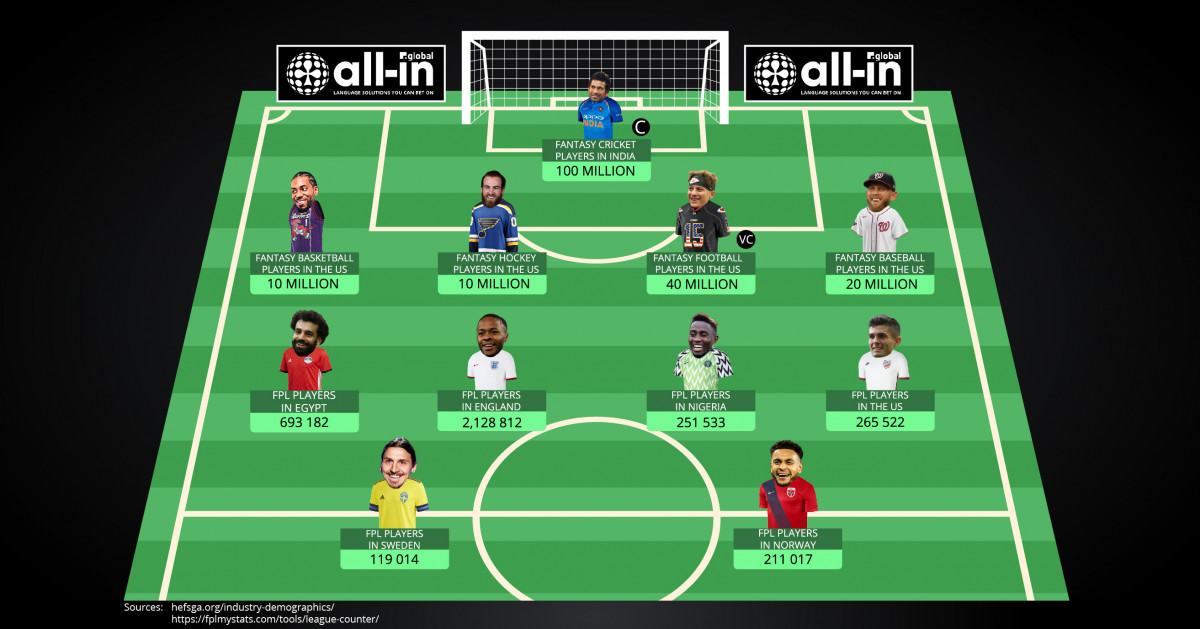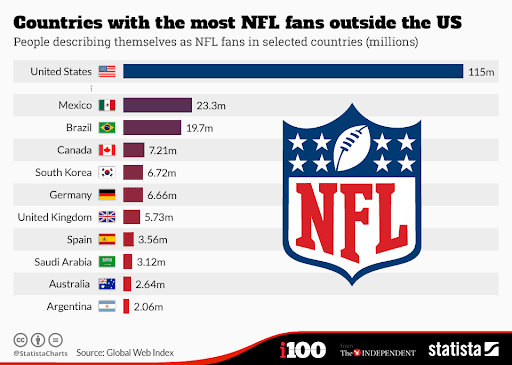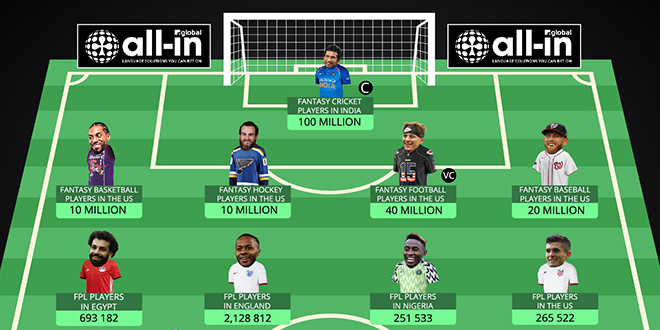All-in Global, the number one language service provider in the gaming industry, has gathered the most relevant data to highlight hot fantasy markets for SBC News readers, and advise interested companies on how to prepare “local” fantasy content.
In 2019, it was estimated that almost 46 million adults (18+) played fantasy sports in the US. In comparison, the Fantasy Premier League (FPL) reached just under 7.6 million players worldwide in the 19/20 season. So, there is no doubt: the US is miles ahead.
While fantasy sports in the rest of the world is mainly focused around soccer (football), the NFL is the flagship of fantasy in the US. According to recent data from The Fantasy Sports & Gaming Association (FSGA), 78% of fantasy participants play fantasy football. Baseball (39%), basketball (19%) and ice hockey (18%) are the closest contenders, followed by soccer (14%), golf (13%) and esports (11%).
The wagering aspect is obviously a big part of the equation, and although betting on fantasy sports is a booming industry, fantasy sports are often viewed as a way to win and retain sports betting customers. 78% of US fantasy sports players bet on sports in 2018, while 75% of sports bettors played fantasy sports in the same year.
So what can we say about preparing “local” fantasy content in the US? First of all – make sure your content is written (or localised) by someone who has US English as their native language.
Americans and the rest of the world cannot even agree on what to call football (soccer) – and that’s just scratching the surface on fantasy terminology – a non-native writer or translator will be immediately exposed by an audience where many consider every tip and statement with careful scrutiny.

Another tip is to look at the 32% increase in FPL players from the US in 18/19 compared to 19/20. The prediction that the big soccer leagues will keep getting bigger was cemented when Manchester City’s UEFA ban due to financial fair play irregularities was lifted last week, and it seems highly likely that the popularity of Premier League and FPL will continue to rise in most corners of the world.
In comparison, the official Major League Soccer (MLS) fantasy game has about 21,500 players so far this season, currently a decrease from about 35K in the year before.
The local popularity of FPL will always rise when local players have success, and we feel certain that Chelsea’s Christian Pulisic will boost FPL interest in the US before the 20/21 season after an impressive run towards the end of 19/20 with 39 points from game week 30 to 35. The potential of the US-born winger far exceeds other US Premier League legends like Tim Howard and Clint Dempsey. You can watch a highlight video from the 10 most capped American players in the Premier League below:
And what about other interesting US related markets? Don’t forget that US sports have large fan bases outside of North America. Many of the people here will understand English, but pretty much all serious research indicates that localised content has a much stronger effect.
It’s easier to establish trust in the local language, especially when you want the visitor to make a deposit. Make sure however that the writer or translator is familiar with fantasy and gaming terminology, as a poor localisation job will have the opposite effect. All-in Global has been operating for more than a decade with its primary objective to provide peace of mind for gaming industry professionals who want their content to be localised with high quality in languages they don’t necessarily understand themselves.
If we ran a website focusing on the NFL, our kick-off move would be to localise to Spanish. As you can see in the 2018 chart from Statista below, Spanish speaking Mexico is the biggest country in terms of NFL fans outside of the US. It’s also worth noting that there are more than 40 million Spanish speakers in the US.

In terms of global representation, FPL is by far the most popular fantasy league outside of the US. In the 19/20 season which is now about to end, players from 255 countries were represented. Our opinion is that great value can be found in the global user statistics from the FPL from a perspective of localisation cost vs. the number of players and their economic potential.
People in the Nordic countries are going ballistic for fantasy football (soccer) and few if any can match their average salary and average spend on betting. Norway, Sweden, Denmark and Finland all had a drastic increase in the number of FPL players from 18/19 to 19/20 and our guess is that this development will continue.
You can, for example, find more than a handful of serious podcasts in Norwegian alone about the FPL. All-in Global was founded by a Norwegian sports journalist in Malta in 2008 and the Nordic languages are all best-sellers among more than 70 other languages that they work with.
Since the FPL game is only available in English these numbers are heavily biased, but of the 25 countries with most players, 12 of them have English as an official language. Keep in mind that the English used in the US can be quite different from the English used in Australia (157K), Nigeria (252K) and Ghana (100K), especially for sports words and expressions.
Localisation from one English dialect to another comes at reduced rates, and when it comes to quantity, as in being understood by a maximum number of people, only Chinese can compete, followed by Hindi, Spanish and French.
India is a booming market across the gaming industry and the number of FPL players from India increased from 188K in 18/19 to 230K in 19/20. This is peanuts compared to the fantasy cricket market in India which is estimated with a value of $150 billion.
Both Spanish and French are big world languages, especially in the world of sports, and it feels like a no-brainer to include them on the list of lucrative languages, especially since they cover so many people in so many different markets.
It’s important, however, to be aware of the regional language differences in India as well as French and Spanish speaking countries. For example, a text that works well in Spain might not be well perceived in Mexico, so it can be wise to confer with a language service provider like All-in Global in the early stages of planning your content strategy.
The last language/market on our list might very well be the most surprising one. Let’s call it a cheeky punt. England is obviously number one on the list of FPL players (2,13 million) but on 2nd place, we find Egypt with 693K (up from 427K in 18/19). Could it have anything to do with Mohamed Salah? It should probably not be ruled out!
Other Arabic-speaking countries where FPL is popular include Saudi Arabia (92K), United Arab Emirates (44K), Iraq (42K), Morocco (37K) and Iran (32K). All of these countries had a significant increase, with Algeria almost quadrupling from 23K to 83K. Qatar, where the World Cup is scheduled in 2022, went from 7K to 13K FPL players.
Gambling is obviously not very common here, but at All-in Global we have seen an increase in Arabic requests lately. There are many Arabic variants but Egyptian Arabic is the most widespread. You can potentially reach a lot of players with the price of just one language.
Are you interested in more data just like this, or do you need help in foreign markets? At All-in Global we offer language solutions you can bet on. You can reach us on [email protected] or visit our website all-in.global.









